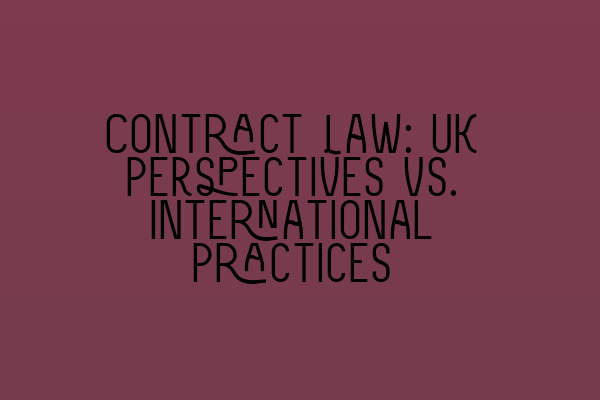Contract Law: UK Perspectives vs. International Practices
Contract law is a fundamental aspect of legal systems worldwide. It governs the agreements made between parties, setting out the rights and obligations of each party involved. While the basic principles of contract law are similar across jurisdictions, there are notable differences between UK perspectives and international practices. Understanding these differences is crucial for legal professionals and individuals involved in cross-border transactions.
In the United Kingdom, contract law falls under common law, which refers to rules developed through judicial decisions. This means that UK contract law is primarily derived from case law, where courts interpret and apply principles established in previous cases. On the other hand, many countries follow a civil law system, which is based on comprehensive legal codes rather than case law.
One significant difference between UK perspectives and international practices is the requirement for formalities in contract formation. In the UK, contracts can generally be formed orally or in writing, with some exceptions, such as contracts for the sale of land. However, in certain jurisdictions, written agreements are often mandatory for certain types of contracts or transactions.
Another key distinction is the approach to interpreting contracts. In the UK, courts prioritize giving effect to the intentions of the parties as expressed in the contract. This is known as the “subjective” approach, focusing on the actual intentions of the parties at the time of contract formation. International practices, particularly in some civil law jurisdictions, tend to adopt a more “objective” approach, focusing on the reasonable expectations of a hypothetical reasonable person in the same circumstances.
When it comes to remedies for breach of contract, UK perspectives and international practices also differ. In the UK, the primary remedy for breach of contract is damages, where the innocent party is awarded monetary compensation to put them in the position they would have been in if the contract had been performed. However, in many civil law jurisdictions, specific performance is a more favored remedy. Specific performance requires the breaching party to fulfill their contractual obligations, providing the innocent party with the promised performance.
It is essential for legal professionals and individuals involved in international contracts to be aware of these differences and take them into account when drafting, interpreting, and enforcing contracts. Failure to do so can lead to disputes and costly legal proceedings.
As a solicitor and contract law expert at SQE Contract Law, I highly recommend staying up-to-date with the latest developments and practices in UK contract law and international contract law. It is crucial to undergo comprehensive preparation for the Solicitors Qualifying Examination (SQE) if you aim to practice law in the UK. SQE 1 Practice Exam Questions and SQE 1 Practice Mocks FLK1 FLK2 are great resources to test your knowledge and readiness for the SQE 1 exam.
To further enhance your preparation, SQE 2 Preparation Courses and SQE 1 Preparation Courses provide comprehensive study materials and guidance for the SQE exams. These courses cover various aspects of contract law, ensuring that you are well-prepared for the challenges that may arise in your legal career.
Stay updated with the latest SRA SQE Exam Dates to ensure you are aware of the examination schedule and can plan accordingly. Taking the SQE exams and obtaining the necessary qualifications will create opportunities for you to excel in the legal profession, both in the UK and internationally.
In conclusion, contract law exhibits both similarities and differences between UK perspectives and international practices. Understanding these differences is essential for legal professionals and individuals engaged in cross-border transactions. Stay updated, prepare diligently, and seize the opportunities that arise in the dynamic field of contract law.
[References:
SQE 1 Practice Exam Questions: https://fqps.co.uk/sqe/sqe1-preparation/mcq-practice-quiz
SQE 1 Practice Mocks FLK1 FLK2: https://fqps.co.uk/sqe/sqe1-preparation/practice-mocks-quiz
SQE 2 Preparation Courses: https://fqps.co.uk/sqe/sqe2-preparation
SQE 1 Preparation Courses: https://fqps.co.uk/sqe/sqe1-preparation
SRA SQE Exam Dates: https://fqps.co.uk/sqe/sqe1-sqe2-exam-dates]
